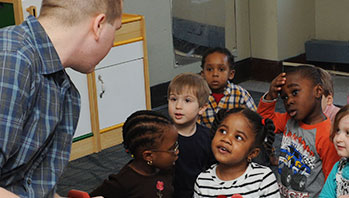- recordings and charts from previous days
- What Is a Scientist? (book)
- loud
- louder
- predict
- quiet
- soft
- softer
- sound
MA Standards:
Speaking and Listening/SL.PK.MA.1: Participate in collaborative conversations with diverse partners during daily routines and play.
Language/L.PK.MA.1: Demonstrate use of oral language in informal everyday activities.
Head Start Outcomes:
Language Development/Receptive Language: Attends to language during conversations, songs, stories, or other learning experiences.
Logic and Reasoning/Reasoning and Problem Solving: Recognizes cause and effect relationships.
PreK Learning Guidelines:
English Language Arts/Language 2: Participate actively in discussions, listen to the ideas of others, and ask and answer relevant questions
Talk Together: Exploring Sound

© Commonwealth of Massachusetts, Department of Early Education and Care (Jennifer Waddell photographer). All rights reserved.
STEM Key Concepts: Sounds have a source; An action has to happen to make a sound; Sounds vary in three ways: volume, pitch, and timbre; A sound becomes louder when the force of the action that is creating the sound is increased; A sound becomes softer, or quieter, when the force is decreased
ELA Focus Skills: Making Connections, Speaking and Listening, Vocabulary
Revisit the book What Is a Scientist? by Barbara Lehn.
- Review how children acted like scientists while exploring sound.
- Emphasize that scientists are explorers who ask questions about the world, make observations, do experiments, and collect data to find answers.
- Say, Just like all of you while you were exploring sound!
Then help children make connections between the book and their own explorations. Turn to specific pages and ask questions. For example,
- Turn to the page that says “A scientist . . . asks questions.” Ask, What were some of the questions you had while you were exploring sound? How did you find or try to find answers to your questions? Guide children by talking about how they learned to make sounds louder/softer with the shakers.
- Turn to the page that says “A scientist . . . makes and tests predictions.” Ask, What are predictions? (a guess based on what you observe and already know) What were some of the things you predicted as you were exploring sounds? What did you do to see if what you predicted was true? Were you surprised by some of the things that were different from what you predicted? Guide children by referring to any recordings (charts, video/tape recordings, etc.) of children’s predictions about sound during the week.
